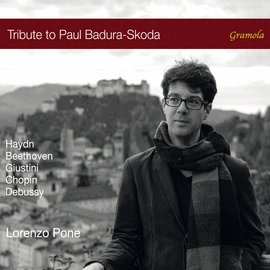Das Problem mit dem David Oistrakh String Quartet scheint zu sein, dass es einmal ganz großartig aufspielt und ein anderes Mal durchaus unerfreulich. Das drückt sich dann in schwankenden Bewertungen aus. Mit dieser CD folgt nun wieder eine runtergeratzte Einspielung. Natürlich agieren die vier Musiker auf Basis hohen technischen Standards, so dass technisch eigentlich keine Missgeschicke passieren. Und irgendwie stimmt schon alles. Aber es gibt in diesem Programm zu viele musikalisch unschöne Passagen, als dass man es genießen könnte. Dabei sind auch interessante Details zu hören, die aber das Gesamtbild nicht aufhübschen können.
Das fängt schon bei dem vierten Quartett von Beethoven an, das die CD eröffnet. Ohne die komponierten Wiederholungen außer beim Minuetto und im rasanten Tempo wird das Werk in 18 Minuten erledigt, wo alle mir bekannten anderen Aufnahmen 23 bis 26 Minuten dauern.
Für den c-Moll Quartettsatz von Schubert gilt das gleiche Problem. Wo andere Interpreten um die neun Minuten benötigen, schafft dieses Quartett es in fünfeinhalb. Wo bleibt da die Ausdruckstiefe und Spannung?
Als letztes Stück dieser Einspielung fügen sie wiederum eine Bearbeitung für Quartett durch ihren Bratschisten von einer Caprice für Violine solo von Paganini an, hier die 24. Das ist spieltechnisch gelöst und versucht wohl, mit den hingerutschten Passagen volksmusikhafte Eindrücke zu vermitteln und bietet dem Primgeiger Gelegenheit, virtuos zu wirbeln.
Das auf der CD an zweiter Stelle angeordnete dritte Quartett von Shostakovich sollte dem Ensemble eigentlich im Blut bzw. den Fingern liegen, sollte man meinen. Leider kann man dieses Vorurteil beim Zuhören nicht bestätigen. Auch hier gilt Schnelligkeit und vor allem auch eklig unsaubere Intonation vielleicht als Interpretationsansatz für die inneren und äußeren Kämpfe, die der Komponist im Kommunismus überleben musste. Wenn man das vermitteln wollte, was ich nicht weiß, dann gibt es dafür viel bessere musikalische Mittel.
Die für den Begleittext für das Beethoven Quartett gewählte Überschrift Anxiety, also Angst, kann man wörtlich nehmen, aber in dem Sinne, dass man Angst habe sollte, die CD zu hören. Denn wirkliche Qualität und vor allem musikalische Intensität vermisst man komplett.
The problem with the David Oistrakh String Quartet seems to be that at one time it performs quite splendidly and at another time quite unpleasantly. This is then expressed in fluctuating ratings. Here follows another scratched down recording. Of course, the four musicians act on the basis of high technical standards, so that technically actually no mishaps happen. And somehow everything is right. But there are too many musically unpleasant passages in this program to enjoy it. There are also interesting details to be heard, but they can’t brighten up the overall picture.
This already starts with the fourth Beethoven Quartet that opens the CD. Without the composed repetitions except for the Minuetto and at a rapid tempo, the work is completed in 18 minutes, where all other recordings I know take 23 to 26 minutes.
The same problem applies to Schubert’s C minor quartet movement. Where other performers need around nine minutes, this quartet does it in five and a half. Where is the depth of expression and tension?
As the last piece of this recording they again add an arrangement for quartet by their violist of a caprice for solo violin by Paganini, here the 24th. This is technically solved and probably tries to convey folk music impressions with the slipped passages and offers the primary violinist the opportunity to whirl virtuosically.
Shostakovich’s third quartet, second on the CD, should be in the ensemble’s blood or fingers, one would think. Unfortunately, one cannot confirm this prejudice while listening. Here, too, speed and, above all, disgustingly unclean intonation are perhaps interpreted as a reflection of the inner and outer struggles the composer had to survive under communism. If one wanted to convey that, which I don’t know, there are much better musical means to do so.
The title chosen for the accompanying text for the Beethoven Quartet, Anxiety, can be taken literally, but in the sense that one should be afraid to listen to the CD. Because real quality and especially musical intensity are completely missing.



















